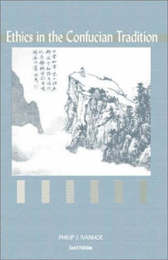
|
Ethics in the Confucian Tradition: The Thought of Mengzi and Wang Yangming
Paperback / softback
Main Details
| Title |
Ethics in the Confucian Tradition: The Thought of Mengzi and Wang Yangming
|
| Authors and Contributors |
By (author) Philip J. Ivanhoe
|
| Physical Properties |
| Format:Paperback / softback | | Pages:256 | | Dimensions(mm): Height 216,Width 140 |
|
| Category/Genre | Oriental and Indian philosophy |
|---|
| ISBN/Barcode |
9780872205970
|
| Classifications | Dewey:181.112 |
|---|
| Audience | | Professional & Vocational | |
|---|
|
Publishing Details |
| Publisher |
Hackett Publishing Co, Inc
|
| Imprint |
Hackett Publishing Co, Inc
|
| Publication Date |
15 March 2002 |
| Publication Country |
United States
|
Description
This volume serves both as an introduction to the thought of Mengzi (Mencius) and Wang Yangming, and as a comparison of their views. By examining issues held in common and central to both thinkers, Ivanhoe illustrates how the Confucian tradition was both continued and transformed by Wang Yangming, and shows the extent to which he was influenced by Buddhism. Topics explored are: the nature of morality; human nature; the nature and origin of wickedness; self cultivation; and sagehood. In addition to revised versions of each of these original chapters, Ivanhoe also includes a new chapter on Confucius' view of the Way, a new Conclusion, bibliography, and index. A revision of the Scholars Press edition of 1990.
Author Biography
Philip J Ivanhoe
ReviewsThis enlightening book is a comparative study of the moral and metaphysical theories of these two luminaries of the Confucian tradition. . . . Ivanhoe draws in masterful strokes the trajectory of the Confucian image of the sage, from the semi-divine creator heroes revered by Kongzi, to Mengzi's human exemplars of perfected self-cultivation, to Wang Yangming's concept of the innate sagehood of every human. --Rene Goldman, Pacific Affairs Ivanhoe's fine book deserves a wide readership. It will interest scholars of Confucianism as well as those specializing in Chinese intellectual history. Two informative appendices, along with the excellent index (which includes the most important Chinese characters used in the book), make it a useful work for specialists. I also recommend this book to anyone concerned with comparative philosophy and to those currently working in virtue ethics. The latter will find many ideas and arguments within this book that resonate with, and perhaps complement, Western virtue ethics. --Victoria Harrison-Carter, Dao: A Journal of Comparative Philosophy
|